
|
Communication in Modern Social Ordering: History and Philosophy
Paperback / softback
Main Details
| Title |
Communication in Modern Social Ordering: History and Philosophy
|
| Authors and Contributors |
By (author) PhD Kai Eriksson
|
| Physical Properties |
| Format:Paperback / softback | | Pages:232 | | Dimensions(mm): Height 229,Width 152 |
|
| Category/Genre | Technology - general issues
Computing - general |
|---|
| ISBN/Barcode |
9781623568382
|
| Classifications | Dewey:303.48330973 |
|---|
| Audience | | Tertiary Education (US: College) | | Professional & Vocational | |
|---|
|
Publishing Details |
| Publisher |
Bloomsbury Publishing Plc
|
| Imprint |
Bloomsbury Academic USA
|
| Publication Date |
23 May 2013 |
| Publication Country |
United States
|
Description
Communication in Modern Social Ordering investigates the modern history of communication in relation to the thinking of the political community in the United States. By illustrating the intertwining of the technological developments in communication methods and its community-building effects, the different representations of society and their political implications are examined against the development of communication systems from the telegraph, to the telephone, to computer networks. It was the telegraph that made communication a continual process, thus freeing it from the rhythmical motion of the postal service and from physical transportation in general, and provided both a model and a mechanism of control. Using the theories of both Foucault and Heidegger to provide a lens for new investigation, the author studies not the meanings of communication and its logic as such but rather the conditions and structures that allow meanings and logic to be formulated in the first place. The book offers an original combination of historical analysis with an ontological discussion of the evolution of telecommunications in the U.S. as a phenomenon of modern social ordering.
Author Biography
Kai Eriksson, PhD, is a lecturer and research fellow in the Department of Social Research at the University of Helsinki. He is a member of a research project called Electronic Governance and New Forms of Political Power; and recently published an extensive Finnish-language monograph on the ontology of networks and networked politics, Maailma ilman ulkopuolta: Verkostot yhteiskunnallisessa ajattelussa (The World without an Outside: Networks in Social Thought) (Gaudeamus 2009).
ReviewsIn this wide-ranging and insightful study of the role of communication in modernity, Kai Eriksson continues the grand tradition of critique in the highest and best sense -- that of exploring potentials and tracing limits. What is at stake is not simply a philosophy of communication or an analysis of the technological, economic, and social systems with which it is associated, but, crucially, a study of the forms of community that these thwart and enable. Communication in Model Social Ordering is a formidable and fascinating work of scholarship: an apt demonstration of the sparks of illumination that result from the collision of theory and history.--Mark Andrejevic, Research Fellow at the University of Queensland's Centre for Critical and Cultural Studies Communication in the Modern Social Ordering traces the "threads" of communicative technologies, social practices, and theoretical treatises as they wind through the United States from the late 19th through the mid-20th centuries. The author highlights the telegraphic "lightning lines" woven like railways across the landscape of America on the verge of modernity. He draws into relief the telephone wires winding under streets and over highways to bind neighborhoods into cities, cities into regions, and both into a nation united by electronically encoded speech. Finally, he reveals the emergence of the computer as the system replacing the telephone exchange as a new center of coordination, command, and control: an intelligence generated by the strategic grammars of corporate and governmental organization. Thus the author traces the outlines of a new social and technological order. Increasingly centralized, rationalized, mathematized, and imagined through the metaphor of the nervous system, communication networks are reformulated in the schematics of the machine and progressively generalized as an oscillation between signal and noise. In the process the theorems of information are inscribed in increasingly lifelike, self-regulating mechanisms. So information theory is revealed here through a discursive history of its embodiments-"a sequence of interrelated but discontinuous formations and constellations of thought and practices," as the author says-in this illuminating (in a way that would please Edison) genealogy of the modern communicative order.--Daniel R. White, Professor of Philosophy, Wilkes Honors College, Florida Atlantic University, author of Postmodern Ecology: Communication, Evolution, and Play
|